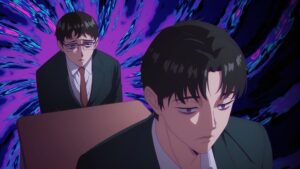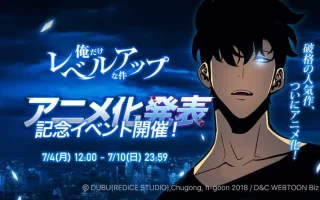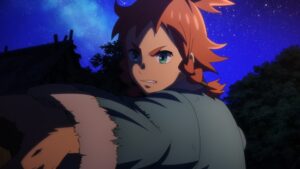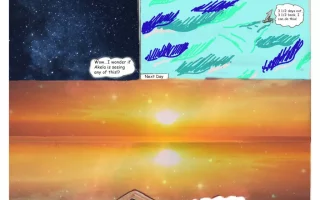Wooper: The fall season is in full swing, which means now is the perfect time to offer weeks-late commentary on some summer anime! I’ve actually had most of these entries written for a while, but another collaborative anime project (which I’m hoping to post before year’s end) delayed the finishing touches. Posts on current series (especially Star Wars Visions and the Tatsuki Fujimoto anthology) will start rolling out in a week or so, but for now, here are my closing thoughts on some of summer’s lesser-seen series.
Captivated By You – 3-5
I was wondering when the Junji Ito-looking dude from this show’s original promo poster would show up. Turns out it wouldn’t be until “Nikaido Behind Me,” a two-part story comprising episodes 4 and 5, which featured an entirely different cast than the first three. I’d have been satisfied if the show had remained at its original all-boys high school until the end, continuing to connect all its stories through the inscrutable Hayashi, but I’d say the detour was worth it for episode 4 in particular. Its Rashomon-style presentation created an interesting relationship between Medaka, an ordinary high school kid, and Nikaido, a willfully gloomy classmate of his, with a mid-episode perspective switch revealing that the latter boy modeled his persona on the former’s temporary misfortune. Though the truth regarding that inspiration is never fully revealed to either character, Medaka quickly learns to see beyond Nikaido’s front, allowing the show to effectively comment on the topic of perception versus reality. (The sequel episode, which followed their class on a trip to Okinawa, offered much less to chew on.)
As for episode 3, I found it to be the weakest of the bunch, though it did manage to address the subject of bullying without inventing a puppy-kicking villain to get its message across, as anime often do. Hayashi played a role in giving the episode’s one-off protagonist the courage to face his tormentor, but the story’s resolution was too tidy, and the closing guitar track gave me ‘corporate training video’ vibes. All in all, Captivated By You didn’t exactly captivate me, but its sister series did – thoughts on that show’s final episode can be found after the jump.
Karaoke Iko! – 5
If the internet is to be believed, almost every scene in this epilogue was anime original, making it one of the best “filler” episodes I can remember watching, ever. There are a lot of schedule-driven shows that would be content to gloss over a character’s three year prison sentence and get back to business as usual, but Karaoke Iko sweated the small stuff: increased cigarette prices, trendy new drinks, not knowing whether your stopped wristwatch will start ever again. The decision to place those observations before the more personal material was a subtle nod to the numbness that results from imprisonment, which I really liked. Kyouji did return to his “family” after a short period of solitude, unfortunately arriving just in time to be crowned the next Sucky Song King, and his subsequent tattooing served as the basis of another great scene between him and his yakuza boss.
Though the boss has a reputation for tattooing people with images they’ll hate, he seems to have a special relationship with Kyouji, since he steered their conversation in a less punitive direction, prodding him to admit how much his old singing teacher had meant to him before his incarceration. Their talk served as a strong foundation for this episode’s full circle ending, which appropriately replayed the airport reunion of the aforementioned singing teacher and his one-time student. We may not have gotten a preview of the series’ Tokyo material (apparently depicted in the sequel manga, Famiresu Iko!), but I’m more than happy with the note on which this miniseries closed.
My Melody & Kuromi – 8-12
This closing phase of My Melody’s plot provided more of Pistachio’s backstory, including the origin of the mysterious Mr. Heart. Perhaps there were hints in earlier episodes, but I didn’t realize until a late game flashback spelled it out for us that he was meant to embody the kindness of the Cloud Kingdom’s benevolent monarch (who was also Pistachio’s father). This was a good twist on its own, as it explained his resonance with My Melody’s good-hearted personality, but the show kind of messed up when it came to Pistachio’s motivation. Thinking about it, if his goal in coming to Mariland was to retrieve his father’s heart, his grudge against My Melody and Kuromi needn’t have intensified as much as it did. In episode 10, he forced My Melo to eat a sleep-inducing cookie in order to make her understand his “loneliness and sorrow,” which I sort of get, since his use of the heart’s magic resulted in the destruction of his kingdom. But in the follow-up, he challenged Kuromi to eat an identical cookie in order to prove that she wasn’t jealous of her friend, which made no sense at all to me. If Pistachio had merely been desperate to recover the heart in order to return his father to life, and we’d skipped straight to his alliance with the girls once he realized they weren’t his enemies, the story might have felt a bit more coherent.
The Summer Hikaru Died – 9-12
In keeping with the investigative tone of episode 8, these four episodes were largely concerned with Yoshiki’s quest to learn the truth of the legends surrounding his hometown. Even a climactic moment like the lurking Company man Tanaka decapitating Hikaru during an audience with one of the village elders ended up taking a back seat to research and flashbacks (Yoshiki reattached his severed head within seconds). As a result, this phase of the show was my least favorite thus far, though the announcement of a second season helps matters quite a bit. There’s still so much we don’t understand with regard to the aforementioned “Company,” which seems to have roots in the spirit world, though the show did tease us with one of its other members appearing at Kurabayashi’s doorstep toward the end of episode 11. Speaking of Kurabayashi, the mysterious housewife played a much bigger role in the first season’s closing chapter than at any other point in its run, advising both boys on how they ought to manage Hikaru’s eldritch condition, and internally monologuing about both his burgeoning humanity and the incalculable threat he poses to ordinary humans.
Finally, episode 12 held up a mirror to number 7’s midseason climax, as a guilt-ridden Hikaru, rather than Yoshiki, attempted to sever the show’s central relationship by declaring his intent to return to the mountains. The boys had made good on their previous promise to visit the beach together, but it only led to them fighting in the shallows (reminiscent of The Flowers of Evil’s conclusion, among other things) before reconciling in the finale’s concluding minutes. There was some cool storyboarding on display toward the end, as well, two examples being the camera looking up from beneath the water and a cut to monochrome with white ripples extending along the ocean’s surface. I sincerely hope that type of attention-grabbing direction returns for the sequel, whenever it emerges.
Leviathan – 9-12
When I previewed Leviathan at the start of the summer season, I said I wanted to give Studio Orange a chance to convert me. Well, now I’ve finished watching their fourth full-length anime series, and I’m finally ready to issue a definitive, “It’s not you, it’s me.” By the time I got to this final chapter of the show, the mismatch between its super-realistic animation and the characters’ stock anime mannerisms was pulling me out of almost every scene. Sharp’s habit of making those little grunting noises to signal her anger, people glancing at each other and nodding as if to confirm for the audience that what just happened was Very Important, adults hanging back and letting Alec and Sharp have extended debates that encapsulated the themes of a given episode… I think the reason other anime can get away with this stuff is because they’re more stylized in comparison. But whenever Leviathan indulges the audience with obvious presentation choices, like an approaching storm to symbolize interpersonal conflict or a musical passage ripped straight from Star Wars (Alec confronting his fencing instructor), it just rubs me the wrong way. The Loris ex machina ending was pretty fun, however – gotta love it when an animal saves the day in a YA novel rather than a tiresome teen hero.
The post Summer 2025 Check-In – Fall Edition appeared first on Star Crossed Anime.




